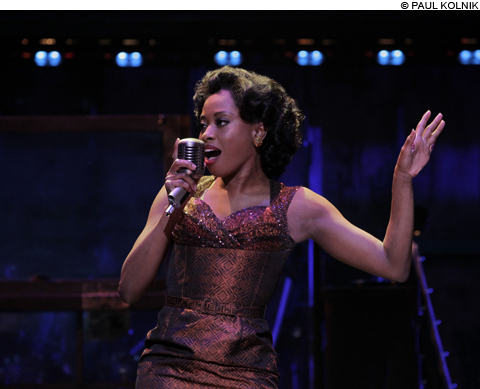
STAR TIME Felicia Boswell in Memphis. |
There are worse concerns in America's history of racial inequities than a white DJ getting eyerolls for playing black music. Nonetheless, the musical Memphis will tick you off about the foolishness anyway, as the touring production at the Providence Performing Arts Center is showing us through December 9.
The premise might amuse us nowadays, but in the 1950s, especially in the South, such concerns were no laughing matter. The show is based on the career of pioneering Memphis disc jockey Dewey Phillips, amped up with adequate dramatic exaggeration by David Bryan's music, Joe DiPietro's book, and lyrics by both of them.
This powerful presentation pulls few punches musically or politically. While there aren't any melodic earworms to keep you humming in the shower, the raucous stompers "Make Me Stronger" and "Tear Down the House" deliver. And while the show is meant for entertainment rather than a history lesson, the violent time certainly is exemplified, from the teenaged daughter slapped hard by her father for listening to "race music," to the character rendered mute as a boy from watching his father be lynched, to the rape of a black woman for interracial dating, and the single, representative use of the N-word.
Our understanding that rock 'n' roll in general was considered the devil's playground by conservative parents in that decade can obscure the fact that black music in particular was even more troubling. A thumping backbeat propelling gyrating hips was bad enough, but gyrating African-American hips? Yikes!
Things start out discouragingly when young white Huey Calhoun (Bryan Fenkart) walks into a black bar in Memphis that's rocking away until he shows up and customers start to leave, thinking that he means trouble. The owner confronts him, annoyed, but doesn't neglect to address him as "sir." But when Huey protests that he loves what they're listening to, belting out "The Music of My Soul," they understand.
That sets things up for the reactions of his white world, as Dewey discovers that people around him are tone deaf to the music even when it's in their interest to listen. He's a department store flunky about to be fired for being clumsy when he saves his job by selling 29 copies of an R&R favorite of his, "Scratch My Itch," by playing it over the loudspeakers.
We can't go long without Huey having a love interest, of course, and she appears in the form of Felicia (Felicia Boswell), the sister of Delray (Horace V. Rogers), the owner of the black bar. She's a great singer, as he is reminded in their duet, "Ain't Nothin' But a Kiss." Now Huey has another reason to become a DJ: getting her some airplay.
Easier yearned for than accomplished. But not by much. He gets rejection after rejection at a few white radio stations until, what the hell, he grabs the mic at one and spins the raucous "Everybody Wants To Be Black On a Saturday Night." His potential boss is apoplectic until teenage listeners start calling in, begging for more. Huey has a job.